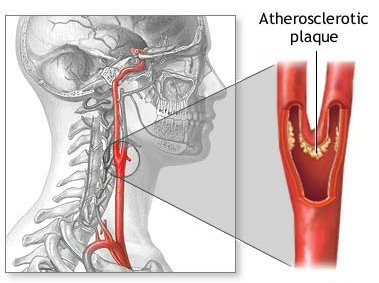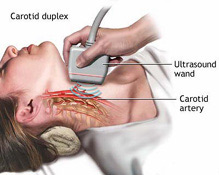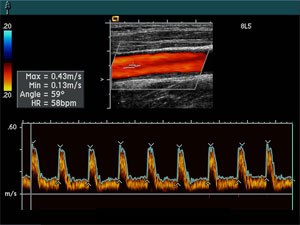

Once a person’s IMT has been precisely established, the individual risk of heart attack and stroke for that person is determined based on database analysis techniques. An individual IMT is only useful when compared against a large repository of IMT data for subjects who are similar in terms of age, gender and ethnicity. This is because atherosclerosis progresses differently for different demographics.
SonoNet incorporates state of the art computerized IMT analysis with the largest and most diverse IMT database on Earth using IMTHeartScan™ which represents the gold standard both in terms of accuracy of measurement and personal risk assessment.
IMT - What is it and Why?
IMT stands for Intimal Medial Thickness. This is the technical way to refer to the thickness of your blood vessel walls. Measuring the IMT is a way to measure atherosclerosis, which is a disease of the vascular system. The progression of this disease leads to cardiovascular and cerebrovascular complications such as heart attack and stroke.
For this reason, tracking and analyzing a patient’s level of atherosclerosis provides invaluable insight into a person’s cardiovascular Heart. Because the IMT of the common carotid artery (located in the neck) is the most accurate indicator of a patient’s system wide atherosclerosis, this is the location that IMT testing is performed.

Who Should Get an IMT Exam?
In 2002, the American Heart Assoication updated their Guidelines for Primary Prevention of Cardiovascular Disease and Stroke to include risk factor assessment for all individuals beginning at age 20.
While we recommend an IMT screening for all individuals, our strongest recommendation is for those individuals with one or more of the following risk factors:

Heart Attack and Stroke
According to the U.S. Centers for Disease Control (CDC), the number one cause of deaths in the U.S. is cardiovascular disease.



What are the Benefits?
A Picture says a thousand words:
Think Early Detection … Take Better Control of Your Patient’s Vascular Care
Patients who are at risk or have already suffered a stroke or heart attack need to know what level of progression of disease currently exists. Keep in mind that patients who had a calcium scoring done in the past need to have a fresh, more predictive look at their disease by having a IMT Scan performed!
The results of IMT Scan testing will allow you to plan a treatment strategy based on individual diagnostic assessment allowing for your optimal health realization.
A Key Practice Benefit
The key to success is keeping patient care and comfort at the forefront of the testing process. While maintaining patient retention and increasing practice revenue is attainable while providing a valuable prevention tool and service to your patients.


Testimonials
Early Diagnosis Helps Parents and Kids
“At the The KidShape® Foundation Carotid IMT ultrasound procedure identifies those children at high risk for future heart disease, and we have been astounded to see the degree definitive evidence of vascular disease occurring at the very early age of even 13 years old.”
- Naomi Neufeld, MD, FACE, - Chief Medical Director of the KidShape® Foundation
Directly Monitor the Need For and Effect of Therapy
“This simple and inexpensive system let's the doctor and patient monitor the need for therapy, the effect of present therapy, the need for lifestyle changes. This picture of a person's vessel is a great motivational tool since it is real and not abstract.”
- Karlis Ullis, MD, Clinical Professor at the
Gonda Diabetes Center, UCLA School of Medicine
Further Reading
Carotid
Ultrasound
Measurement of Intima-Media Thickness -
Dr Jacque Barth MD
Warning Signs of Stroke? American Heart Association
Heart Disease and Stroke? American Heart Association